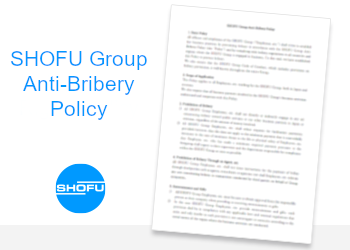SHOFU Anti-Bribery Policy

1. Basic Policy
All officers and employees of the SHOFU Group (“Employees, etc.”) shall strive to establish fair business practices by preventing bribery in accordance with the SHOFU Group Anti-Bribery Policy (this ”Policy”) and by complying with bribery regulations in all countries and regions where the SHOFU Group is engaged in business. To that end, we have established this Policy to prevent bribery.
We also ensure that the SHOFU Group Code of Conduct, which includes provisions on bribery prevention, is well-known throughout the entire Group.
2. Scope of Application
This Policy applies to all Employees, etc. working for the SHOFU Group, both in Japan and overseas.
We also request that all business partners involved in the SHOFU Group’s business activities understand and cooperate with this Policy.
3. Prohibition of Bribery
- All SHOFU Group Employees, etc. shall not directly or indirectly engage in any act constituting bribery toward public servants or our other business partners in Japan or overseas, regardless of the amount of money involved.
- All SHOFU Group Employees, etc. shall refuse requests for facilitation payments; provided, however, that this does not apply to the minimum payment that is unavoidably necessary in the case of imminent threat to the life or physical safety of Employees, etc. Any Employee, etc. who has made a minimum required payment pursuant to the foregoing shall report to their supervisor and the department responsible for compliance within the SHOFU Group as soon as possible.
4. Prohibition of Bribery Through an Agent, etc.
All SHOFU Group Employees, etc. shall not issue instructions for the payment of bribes through third parties such as agents, consultants or agencies; nor shall Employees, etc. tolerate any acts constituting bribery in transactions conducted by third parties on behalf of Group companies.
5. Entertainment and Gifts
- All SHOFU Group Employees, etc. must be sure to obtain approval from the responsible person at their company when providing or receiving entertainment or gifts.
- In the case SHOFU Group Employees, etc. provide entertainment and gifts, such provision shall be in compliance with any applicable laws and internal regulations that exist, and only insofar as such provision is not extravagant or excessive according to the social norms of the region where the business activities are conducted.
- All SHOFU Group Employees, etc. must maintain accurate records of payments when providing entertainment or gifts.
6. Establishment of an Anti-Bribery System
SHOFU Group will establish a department responsible for compliance and an internal reporting channel to enable Employees, etc. to anonymously consult or report acts of bribery they have discovered. Furthermore, those who make a consultation or report will not be subjected to any disadvantageous treatment.
7. Education and Training
SHOFU Group will ensure thorough awareness of this Policy and promote understanding of the prohibition of bribery through appropriate training and education as a measure to prevent acts of bribery by Employees, etc.
8. Recording and Retention of Transaction Details
SHOFU Group will prepare and retain accounting records, etc. for all transactions and asset disposals to demonstrate that prohibited acts of bribery are not being committed. It is prohibited to make false, misleading or incomplete entries in accounting records, etc.
9. Penalty for Violation
Violations of this Policy or any country’s anti-bribery laws are subject to disciplinary action in accordance with SHOFU Group regulations, and will be reported to the relevant authorities as necessary.
Definition of Terms
“SHOFU Group” means SHOFU INC. and its group companies in Japan and overseas.
“Business partner” means all third parties involved in transactions or business activities with the SHOFU Group, including our suppliers, retailers and dealers.
“Public servants” means Japanese public servants, foreign public servants; international public bodies, political parties, and their employees; candidates for public office, and any other persons who may be considered public servants. This also includes close third parties such as their immediate family members (spouses, children, dependents, etc.)
“Bribery” means any act of providing, receiving, promising, demanding, soliciting or accepting money, goods or other unjust benefits for the purpose of influencing the performance of duties or decisions by the recipient, or inducing the recipient to engage in other improper acts, in order to obtain unjust benefits. Furthermore, we recognize that small payments made to public servants without discretionary authority, such as facilitation payments aimed at streamlining and expediting administrative procedures, also constitute a form of bribery.
“Money, goods or other unjust benefits” includes anything beneficial to the recipient, regardless of its name, whether it be cash, cash equivalents, gifts, services, employment, loans, travel expenses, entertainment such as meals and tickets to sporting events, political contributions, charitable donations, subsidies, per diem allowances, sponsorships, gratuities, etc.
Established October 10th 2025





